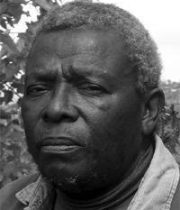Mafika Pascal Gwala

Mafika Pascal Gwala (1946 – 2014) was a contemporary South African poet and editor, writing in English and Zulu. Gwala was born, and grew up in Verulam and spent most of his adult life in the semi-rural township of Mpumalange, KwaZulu-Natal. His working life there, and in Johannesburg, included stints as secondary school teacher, legal clerk, factory worker, and industrial relations officer. He wrote his MPhil on Politics in 3rd World Developing Countries at the University of Natal.
He also worked in England as a researcher on adult education at the University of Manchester.
Gwala emerged as a significant writer in the 60s and 70s during his association with the black South Africans Student Organization and the Black Communities Project in Durban, which was banned in 1977.
A prominent activist and writer of that era – expressing the political, needs and aspirations social, cultural, and emotional of all those victimised by apartheid – he was closely associated with the ‘Soweto Poets’ – Mongane Wally Serote, Mbuyiseni Mtshali, James Matthews, and Mandla Langa. In 1973, he edited Black Review, and his short stories, essays and poems have been published in numerous journals and anthologies. His poetry collections include Jo’Liinkomo (1977) and No More Lullabies (1982). He also worked with Liz Gunner and co-edited Musho! Zulu Popular Praises (1991), a literary commentary on Zulu poetry which includes two of his praise poems. Mafika Gwala has performed his work nationally and internationally.
One of his best-known poems is “Children of Nonti”, written in one morning at the request of his friend and one of the founders of the Black Consciousness Movement Strini Moodley. Gwala says “the poem uses the flexibility of English and has the beauty of Zulu meters, which are not easily accessible to non-Zulu speakers.” Ari Sitas writes in “Traditions of Poetry in Natal” “[Nonti] is an Africanist affirmation of pride and dignity” and adds that “every subsequent poet in Natal … has been writing in his shadow” (Journal of South African Studies, 1990).
“His poetry touches on the continuities between the urban-new and the rural-traditional” write Douglas Killam and Ruth Rowe, editors of The Companion to African Literature. “He is acutely conscious of sound and movement, with a particular feeling for jazz rhythms. Throughout there is a focus on emotions and experiences with a human authenticity and power that will make them ultimately liberatory”
Extract from “Getting off the Ride”
My boots jar me
as I take the corner off Grey Street
Into Victoria’s busy, buzzy Victoria
Beesy Victoria’s market area.
Some black mamas kneeling
their hands on the sidewalk
their second-hand clothes before them,
They kneel as if in prayer.
A white hippie bums towards them
with what shapes into a pair of
fawn corduroy jeans:
‘They are fishbottomed’, the aunt tilts
the deal. The seller hooks a feigned smile
with his cagey chin,
Looks like they both have no choice
So the limp deal is sealed.
With unease the hippie moves off
You’d swear he’s left a bomb to detonate;
I radar his moves
whilst yarning my eyes onto the mama,
the mama still on that solemn kneel
that’s accompanied by somber looks
from close range.
Where’s that hippish fixer?
Into the market lanes for a blow-up;
And the black mama to scrounge a sale
after a wash of these sweaty pants
that can only be bought by some black brother
whose boss won’t give him enough to afford
a pair of decent trousers.
And again I know I’m being taken for a ride.
Bibliography
Poetry
1977. Jol’iinkomo. Johannesburg: A. Donker. 1982. No More Lullabies. Johannesburg: Ravan Press.
Edited
1973. Black Review. Durban: Black Community Programmes. 1991. Musho! Zulu Popular Praises. With Liz Gunner. Michigan State University Press.